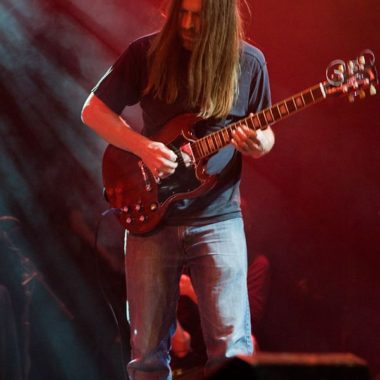Siouxsie and the Banshees released their second record in 1979, after a quick rush to fame and acclaim (in England, anyway) with their first single and debut album the previous year. Join Hands didn’t do much to capitalize on earlier success. The album was tense, unhinged, unnerving, built from the unexpected inspiration of the first world war and informed by military aggressions of the current day. Unlike some of the group’s albums, Join Hands hasn’t aged, in sound or lyrics.
Off Black, the second album by Bare Wire Son, brings that Banshee classic to mind. It doesn’t much sound like Join Hands. Siouxsie Sioux’s backing band had a huge sound, but it was just three people plus some effect pedals and overdubbing. Olin Janusz’s band for Black Out includes three additional vocalists, two guitarists (one playing lap steel), cello, piano and drums, in addition to his own guitar, bass, mandolin, organ and synthesizers. He also employs someone for support and emotional maintenance, whom one would hope was well compensated because the album is an emotional dredging.
The British-born Janusz wrote the album while living in Poland, basing much of it on diaries of mothers whose sons were fighting in World War I. (The journals of German expressionist artist Käthe Kollwitzn, whose work graces the cover, provided further source materials.) Like Join Hands, Off Black isn’t a period piece. Neither album sounds quite like something of its own time or of the period it concerns. In that regard, the albums are more like movies, aiming to conjure a feeling, to plunge the listener into the darkness of war rather than depict it in any literal way. Lyrically, the albums address their subjects only passingly. They’re not documentaries or history lessons, they’re sequences of scenes, and they’re both decidedly bleak.
Off Black is certainly dark and moody. Through gradual, orchestral swells and creeping guitar riffs—mastered like a cut diamond by Doug Henderson, who has added sheen to the sound of Swans, Metallic Falcons and the Necks—Janusz emits grim poetics (“put your sorrow in the bellows,” “these trenches run hollow with the crow”) from a voice buried deep in his throat. But it’s not altogether a funeral dirge. Occasionally a slow groove will drag itself to the surface, almost like an accidental Dirty Three song. Those moments don’t last long, but they do provide a few moments to breathe during what is an otherwise beautifully mournful album. It’s streaming in full on Bandcamp and other platforms as of May 14 and is available for download or on cassette (in an edition of 33) through the Russian label Sination.










